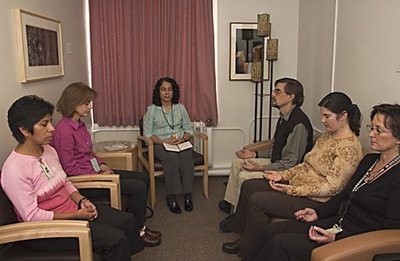November 8, 2007
Stressed out? Take a meditation break at Harborview
Too much stress and anxiety in your life?
Dr. Uma Malhotra, UW assistant professor of medicine, allergy and infectious disease, may be able to help.
Since April, Malhotra has been offering meditation classes at Harborview Medical Center for faculty, staff and the public.
Each class includes simple guided meditations and teachings on dealing with issues such as anger, stress and anxiety. Her next series, “A Meaningful Life,” explores teachings on giving, patience, and other practices to make life more meaningful and less stressful. Sessions are on Tuesdays, Nov. 6, 13, 20 and 27 from 12:15 to 1 p.m. in the Meditation Room, 1EH-114, on the first floor of the East Hospital at Harborview.
Malhotra believes strongly in the power of the mind to affect one’s well-being.
“Our minds are such powerful determinants of our experiences, including illness and health,” she says. “The mind has so much capacity and we focus so little on training it. It’s amazing how training your mind can change your view of suffering, happiness, and pain.”
A Buddhist practitioner and teacher, Malhotra came to Harborview as an infectious disease fellow in 1995 and has been practicing medicine there since then. She is conducting research on the immunopathogenesis of HIV and vaccine development at the Fred Hutchinson Cancer Research Center. Malhotra also participates in the International AIDS Research Training Program to build HIV research capacity in developing countries like India, her native country. She has studied Buddhism at the Vajralama Buddhist Center in Seattle since 2001.
Malhotra says meditation has enhanced her medical practice, where she treats many patients with HIV infection and AIDS.
“I have taken care of most of my patients for many years now, so I have a relationship with them,” Malhotra says. “Many are dealing with so much in their lives, not only their disease, but homelessness, substance abuse, depression, anxiety, and sometimes social isolation.”
She says that because of her longtime relationships with her patients she has been able to introduce them to meditation techniques that help them calm their minds and allow them to partner with her in taking a more holistic approach to treatment.
“If I didn’t have a relationship with them, I think it would be harder to introduce some of these techniques. I work with them on acceptance — acceptance of their illness and of what’s going on in their lives. Patients clearly respond differently if they are able to accept, rather than deny or reject, their illness and its impact on their lives.”
Malhotra says acceptance leads to a more peaceful mind “and that certainly helps their compliance with the medical treatment program and I can support them better with their other issues.
“We are so focused on the external world for providing us with happiness that we seek. However, we don’t recognize the power of our minds to perceive and create our reality. We often think we can create happiness by altering all the external things in our lives. But there’s something in our minds that we need to change. Meditation is one way to train and change our minds.”
The meditation classes are sponsored by UW Medicine Spiritual Care. For more information about other spiritual care offerings, visit http://depts.washington.edu/chaplain/ or call 206-744-3542.
For information about Malhotra’s meditation sessions, contact her at uma@u.washington.edu.

